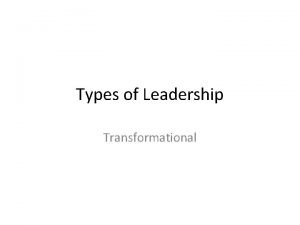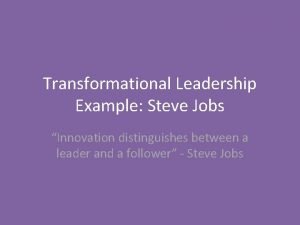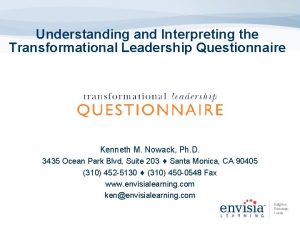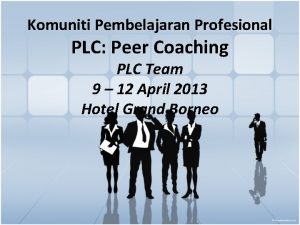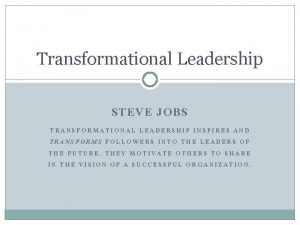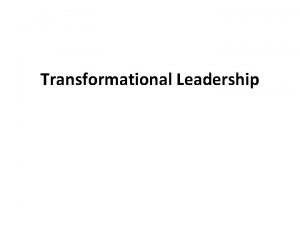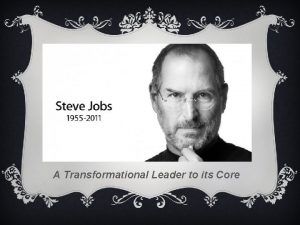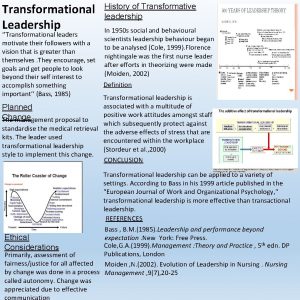Transformational Leadership and Mentoring Doug Lawrence Talent C






































- Slides: 38

Transformational Leadership and Mentoring Doug Lawrence Talent. C® - People Services Inc.

Agenda • A Story! • Transformational Leadership: – What is transformational leadership? – History – Role – Why do we need it? – Impact to our business of having and not having transformational leadership

Agenda • Mentoring: – What is mentoring – History – Role – Why do we need it? – Impact to our business of having and not having transformational leadership • Comparison

Agenda • Business Value and Impact of partnership of the two skills

A Story! • • • Person in a “leadership role” Leading team of 140 personnel Tasmanian Devil Syndrome Impact on staff Culture

Transformational Leadership • Polling Question #1: Which of the following are attributes/skill sets of a transformational leader?

Transformational Leadership • Defined: “Transformational leadership enhances the motivation, morale and performance of followers through a variety of mechanisms. These include connecting the follower’s sense of identity and self to the mission and the collective identity of the organization; being a role model for followers that inspires them; challenging followers to take greater ownership for their work, and understanding the strengths and weaknesses of followers, so the leader can align followers with tasks that optimize their performance. ”

Transformational Leadership • What is transformational leadership? – It is a leadership style that is focused on team building, motivation and collaboration with employees at all levels – The goal is change for the better – Leaders and followers help each other to advance to a higher level of morale and motivation (James Burns – 1978) – Style offers a purpose

Transformational Leadership – Fits into the higher level needs in Maslov’s Theory of Human Needs

Transformational Leadership • Where did this style come from? – First coined by J. V. Downton in: Rebel Leadership: Commitment and Charisma in a Revolutionary Process (1973) – James Mac. Gregor Burns first introduced the concept in his book: Leadership (1978) – Burns was one of the first scholars to assert that true leadership creates change and achieves goals – It also changes people involved for the better

Transformational Leadership – Bernard Bass, a discipline of Burns defined transformational leadership in how the leader affects followers • Transformational Leadership has evolved and contains elements of preceding leadership types such as trait and behaviour theories, charismatic, situational and transactional leadership

Transformational Leadership • To understand the role – we need to understand the components of transformational leadership! • Four components of transformational leadership: – Idealized influence – charisma – Inspirational motivation – Intellectual stimulation – Individualized attention

Transactional Leadership • Idealized Influence – Charisma – Degree to which a leader behaves in admirable ways resulting in followers – Displays conviction, takes a stand, and appeals to followers on an emotional level – Clear set of values – Role model – Genuine trust – Solid moral and ethical foundation

Transactional Leadership • Inspirational Motivation – Articulation of a vision that is inspiring and appealing to followers – Challenge followers with high standards, communicates optimism and provides meaning – a sense of purpose – All of this must be supported with strong communication skills – convey message in a compelling and persuasive manner

Transformational Leadership • Intellectual Stimulation – Degree to which the leader challenges assumptions, takes risks and solicits followers' ideas – Leaders stimulate and encourage creativity – Vision provides the framework for followers to see how they connect to the leader, the goal, organization and each other – Gives followers the latitude to accomplish goals

Transformational Leadership • Individualized consideration or attention – Degree to which the leader attends to each follower’s needs – Acts as a mentor or coach – Listens to followers concerns and needs – Respects and celebrates each follower’s individual contribution

Transformational Leadership – Educates the next generation of leaders – Propels followers to further achievement and growth – Two way communication is a hallmark – Mentoring is a key aspect of individualized consideration (Bass 1998)

Transformational Leadership • So, why do we need this style of leadership? • What is the business value? • Why and Business Value: – Organizations are facing a lot of change – Major business challenges facing organizations world-wide – Organizations need to create the right culture to attract and retain

Transformational Leadership – Need to develop our future leaders – Need to develop current leaders – Downsizing taking place resulting in employees that are left doing more with less – Transformational leaders transform organizations and people – Focus on transforming others to help each other – They ask questions and challenge others – Socratic style of teaching

Transformational Leadership • Summary: – Transformational leaders motivate others to do more than they originally intended or thought possible – Set challenging expectations and achieve higher performances – Have more committed and satisfied followers – Empower followers

Transformational Leadership • Summary…………continued — Pay attention to individual needs and personal development – Help followers develop their own leadership skills – Help the organization as a whole navigate through the tumultuous sea of change

Mentoring • Polling Question #2: Which of the following are attributes/skill sets of a mentor?

Mentoring • History of Mentoring – Dates back to Greek Mythology – Homer’s “Odyssey” (Butcher and Lang – 1890) – over 3, 000 years ago – 18 th Century - Five (5) publications on mentoring – Classified as the oldest form of teaching – Last part of the 20 th century Mentoring has gained more prominence in the business world

Mentoring – Mentoring performing a psychosocial function (Kathy Kram – 1983) – “Everyone Needs a Mentor” – David Clutterbuck – 1983 – Research has shown that mentoring is about change, transition and leadership – Shift is to move away from your Boss being your mentor to someone that you do not work with

Mentoring • Role: – Teacher – Guide – Counsellor – Friend – Coach – Advisor – Role Model

Mentoring • Role: – May not be all of the roles at the same time – May not be all of the roles for a particular relationship – Role is usually determined by the relationship and the needs of the protégé/mentee – To develop a trusted relationship – To understand that the relationship is two way – Both will learn from the experience

Mentoring • Role: – Maintain confidentiality – Socratic style of teaching – Develop their Critical thinking skills

Mentoring • Value of Mentoring: – Stronger corporate culture – a mentoring culture – Better positioned to attract and retain – “we support and maintain a mentoring culture” – Employees with mentors make more money, are better socialized into the organization and are more productive – (Wharton Business School) – Employees experience less stress, and get promoted quicker

Mentoring • Value: – Organization sees increased employee engagement and productivity – Positive work culture – a mentoring culture – Benefits of Mentoring – Research Paper by Triple Creek and Associates – (www. 3 creek. com)

Comparison Individualized Consideration • Transformational Leadership: – – Two way communication Psychosocial support Helping Others Follower’s needs for achievement, personal and professional growth • Mentoring – Two way communication – Psychosocial support – Helping Others – giving back – Follower’s needs for achievement, personal and professional growth

Comparison Idealized Influence • Transformational Leadership: – Leader demonstrating what constitutes appropriate behaviour – Respect and Trust – two way • Mentoring – Role modeling – Respect and Trust – two way – Adoption of demonstrated appropriate behaviour

Comparison Inspirational Motivation • Transformational Leadership – Articulation of a shared vision – Motivate and inspire followers – Focus on the future – Enhancing meaningfulness of the work • Mentoring: – Challenging assignments – Self-esteem – Motivation on the personal and professional growth

Comparison Intellectual Stimulation • Transformational Leadership: – Providing intellectual stimulation – Innovative and creative skills – Questioning assumptions – Reframing problems – Critical thinking skills • Mentoring: – Critical thinking skills – Questioning – Reframing – Avoiding public criticism of mistakes – Thinking outside the box

Conclusion • Role for mentoring in leadership development programs (Bass, 1985; Kotter, 1998; Kram, 1985; Yukl, 1998) • Transformational leaders are necessary for sustained organizational success • Mentoring nurtures transformational leadership

Conclusion • There are many similarities in skill sets between transformational leadership and mentoring • Transformational mentoring, “Leader mentoring behaviours that foster the development of transformational leaders” (St. Clair and Deluga – 2001)

Wrap Up • Please feel free to send me any questions that you may have to my email at the end of the presentation • Please take the time to tell us how we did today by completing the evaluation at the conclusion of the presentation • Take time to tour the virtual event • Make sure you join us again at HR. com!

THANK YOU

Talent. C - People Services Inc. 1222 Baird Street North Regina, Saskatchewan Canada S 4 X 3 B 6 President – Doug Lawrence Email: doug. lawrence@talentc. ca Website: www. talentc. ca Phone: (306)924 -2296 Cellular: (306)537 -6759
 Transactional vs transformational leadership
Transactional vs transformational leadership Kouzes and posner transformational leadership model
Kouzes and posner transformational leadership model Transformational leadership and conflict management
Transformational leadership and conflict management Individualized consideration
Individualized consideration Why is steve jobs a transformational leader
Why is steve jobs a transformational leader Transformational leadership factors the 4 i's
Transformational leadership factors the 4 i's Howard schultz leadership style
Howard schultz leadership style Howard schultz transformational leadership
Howard schultz transformational leadership Leadership by peter northouse
Leadership by peter northouse Transformational leadership synonym
Transformational leadership synonym Lydia dreyer
Lydia dreyer Transformational leadership
Transformational leadership Transformational leadership inventory
Transformational leadership inventory Individualized consideration
Individualized consideration Transformational leadership inventory
Transformational leadership inventory Four i's of transformational leadership
Four i's of transformational leadership Transformational leadership northouse chapter 8
Transformational leadership northouse chapter 8 Steve jobs as transformational leader
Steve jobs as transformational leader Transformational leadership
Transformational leadership Transcendent leadership vs transformational
Transcendent leadership vs transformational Steps for transformational leadership
Steps for transformational leadership Mahatma gandhi transformational leader
Mahatma gandhi transformational leader Transformational leadership steve jobs
Transformational leadership steve jobs Transactional leadership
Transactional leadership Va healthcare leadership talent institute
Va healthcare leadership talent institute Adaptive leadership theory
Adaptive leadership theory Situational leadership vs adaptive leadership
Situational leadership vs adaptive leadership How to accomplish performance monitoring and coaching form
How to accomplish performance monitoring and coaching form Feedback coaching and mentoring
Feedback coaching and mentoring Maksud peers dalam bimbingan instruksional
Maksud peers dalam bimbingan instruksional Ethics in coaching and mentoring
Ethics in coaching and mentoring Ts 25 kohort 6
Ts 25 kohort 6 Doug harwood
Doug harwood Doug feery barrister
Doug feery barrister Doug shoupp deloitte
Doug shoupp deloitte Doug macredie
Doug macredie Doug long iqvia
Doug long iqvia David marchak
David marchak Rob hall doug hansen
Rob hall doug hansen









